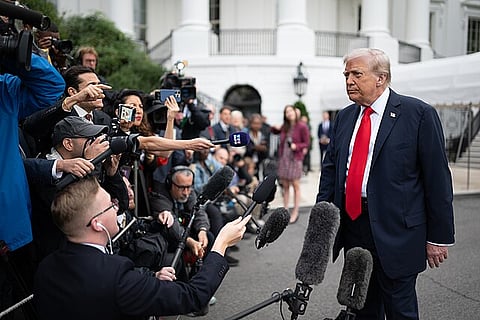

President Donald Trump delivered a confrontational address to the United Nations General Assembly, rejecting a growing international movement to recognize a Palestinian state and threatening strong economic measures against Russia over its war in Ukraine. In his first UN speech since returning to office, Trump framed the recognition of Palestine as a "reward" for Hamas, aligning firmly with Israeli Prime Minister Benjamin Netanyahu's position . On Ukraine, he announced readiness to impose "a strong round of powerful tariffs" on Russia, contingent on European allies joining identical measures to force President Vladimir Putin to end the conflict . The speech underscored Trump's "America First" approach, mixing criticism of international institutions with boasts about his own deal-making abilities .
Palestinian Statehood
Trump directly challenged key Western allies, including France, Britain, Canada, Australia, and Portugal, which have recently recognized Palestinian statehood. He stated that such unilateral moves "encourage continued conflict" and serve as a reward for the "horrible atrocities" committed by Hamas on October 7 . Instead, he called for a focus on securing a ceasefire and the release of all hostages held in Gaza. This stance comes amid a devastating humanitarian crisis in Gaza, where local health authorities report over 65,000 Palestinians have been killed since the war began . A recent UN Commission of Inquiry report concluded that Israel has committed acts of genocide in Gaza, a finding Israel has dismissed as distorted .
Economic Threats and Shifting Stance on Ukraine
Trump's policy on Ukraine appeared to shift during the UN gathering. After meeting with Ukrainian President Volodymyr Zelenskyy, Trump posted on Truth Social that Ukraine is in a position to "fight and WIN all of Ukraine back in its original form" with support from the EU and NATO . This marked a departure from his previous suggestions that Ukraine might need to cede territory for peace. He threatened to impose powerful tariffs on Russia but made this conditional on European nations ceasing all energy purchases from Russia, stating they are "funding the war against themselves" . European officials from countries like Hungary expressed practical difficulties in immediately complying, citing dependence on Russian energy infrastructure .
Broader Grievances and "America First"
The nearly hour-long speech served as a platform for Trump's broader grievances. He criticized the UN as ineffective, claiming it produces "empty words" instead of action . He urged world leaders to adopt hardline immigration policies, touted his domestic deportation record, and labeled climate change as "the greatest con job ever perpetrated on the world" . He also mixed in humor, mocking a malfunctioning escalator and teleprompter at the UN headquarters . His comments often veered off-script, including false claims and personal insults, reinforcing his administration's departure from traditional diplomatic norms .
Isolated US Position
The speech highlighted the United States' isolated position on several global issues. The move by Western nations to recognize Palestine was described by their leaders as a necessary step to preserve the possibility of a two-state solution . Similarly, European allies are cautiously parsing Trump's statements on Ukraine, with some concerned he may be setting the stage for restoring relations with Moscow at Kyiv's expense . UN Secretary-General António Guterres, in his own address, defended multilateralism, warning of a "dangerously chaotic" world and emphasizing that "people everywhere are demanding something better" .